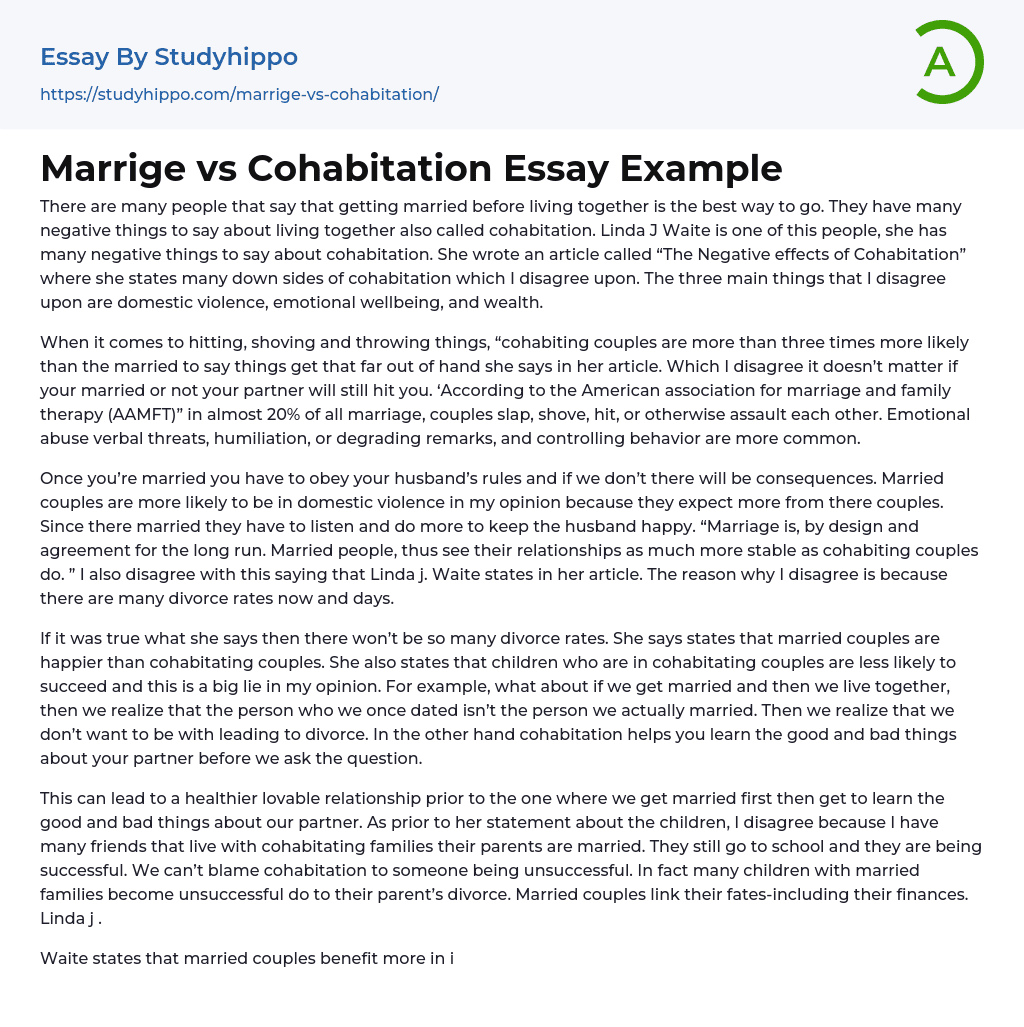Although there are supporters of marrying before cohabiting, there are also those who have negative opinions about living together. Linda J Waite is one such individual who holds a pessimistic perspective.
The author's article "The Negative effects of Cohabitation" explores the drawbacks of cohabitation, but I have a different viewpoint. I particularly disagree with the author's perspective on domestic violence, emotional well-being, and wealth. The article claims that cohabiting couples are over three times more likely to exhibit physical aggression like hitting, shoving, and throwing objects compared to married couples. Nonetheless, I believe that both married and unmarried partners can display violent behavior.
Approximately 20% of marriages involve physical violence such as slapping, shoving, hitting, or other forms of assault, according to the AAMFT. Emotional abuse, including verbal threats, humiliation, degrading remarks, and controllin
...g behavior, is even more common. Many people believe that once they are married, they must obey their spouse's rules or face consequences. In my view, domestic violence is more likely to occur in married couples because there are higher expectations placed on partners. Marriage involves actively listening and making efforts to keep one's spouse happy. It is important to acknowledge that marriage requires mutual consent and agreement as it is a long-term commitment.
Linda J. Waite suggests that married couples view their relationships as more secure in comparison to cohabiting couples, but I hold a contrasting viewpoint considering the widespread occurrence of high divorce rates. If Waite's assertion held true, there wouldn't be such a substantial number of divorces taking place.
According to her, married couples are happier than cohabitating couples and she also believes that children in cohabitating relationships have fewer chances of succeeding
However, I have a different opinion on this matter. Let's consider a situation where two individuals choose to get married but later realize they are not compatible, resulting in a divorce.
Although there is a common belief that cohabitation has negative consequences, it actually offers a chance to understand both the positive and negative qualities of a partner prior to marriage. Consequently, this can result in a more affectionate and satisfying relationship compared to uncovering these traits after tying the knot. As for the debate about children, I have personally witnessed numerous instances where children from families who lived together before marriage are now happily married themselves. These children attend school and are flourishing.
Attributing someone's lack of success to cohabitation is unjust. Conversely, numerous children from married families face failure due to their parents' divorce. Married couples share a future that encompasses their financial circumstances. Linda J. Waite claims that married couples enjoy greater financial benefits, a viewpoint I disagree with.
Cohabitation offers comparable benefits to marriage but without the potential hardship of a divorce. A participant expressed this sentiment, saying that if you're living together and one person decides to leave, it can be resolved easily, whereas in marriage, legal professionals may have to be involved and the situation could become messy depending on the circumstances. Therefore, even if we were married, the financial advantages would remain unchanged since couples opt for cohabitation primarily to share expenses. ttp://www.
Theatlantic.com asserts that numerous individuals opt for cohabitation as opposed to marriage due to the fear of lifelong solitude. However, they overlook the fact that hastily entering into marriage can result in divorce. Cohabitation permits separation without violating
any commitments. Hence, it is crucial to contemplate whether we desire a life post-divorce or genuine happiness prior to tying the knot.
- Adoption essays
- Aunt essays
- Babies essays
- Bedroom essays
- Caring essays
- Children essays
- Daughter essays
- Divorce essays
- Dog essays
- Dysfunctional Family essays
- Family Tradition essays
- Family Values essays
- Father essays
- Foster Care essays
- Friends essays
- Grandparent essays
- Home essays
- Hometown essays
- Husband essays
- Jealousy essays
- Love essays
- Marriage essays
- Mother essays
- Online Dating essays
- Parenting essays
- Parenting Teens essays
- Parents essays
- Relationship essays
- Room essays
- Sibling essays
- Sister essays
- Wedding essays
- Wife essays
- Caste System essays
- Citizenship essays
- Civil Society essays
- Community essays
- Culture essays
- Deviance essays
- Discourse Community essays
- Female essays
- Filipino People essays
- Igbo People essays
- Indigenous Australians essays
- Indigenous Peoples essays
- Men essays
- Middle Class essays
- Minority Group essays
- Modern Society essays
- Popularity essays




